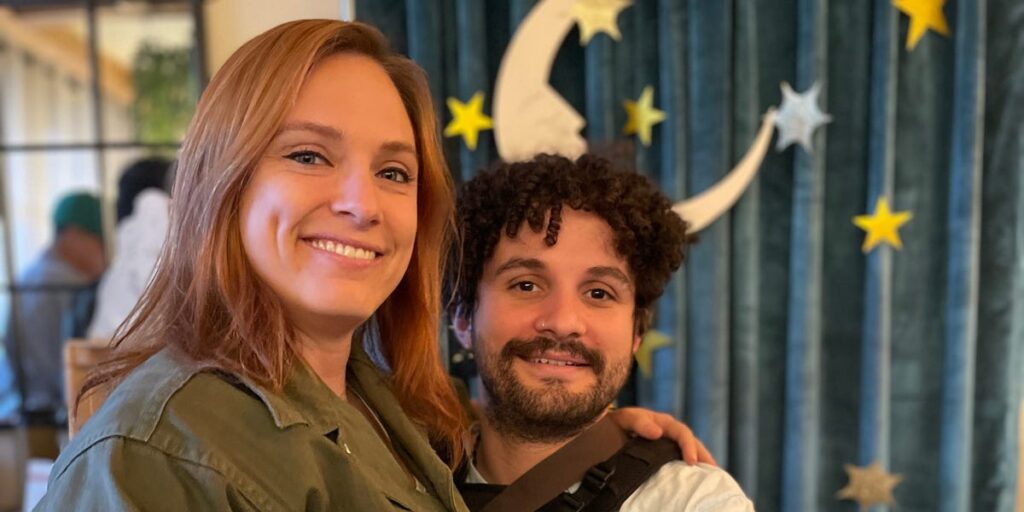Two years ago, my husband, Daniel, was in a life-altering traffic collision that severed his spinal cord at his lower back.
He couldn’t feel his legs at the scene and was taken away to the ER, where they assessed his condition and immediately sent him to the local hospital for a spinal fusion surgery.
This event almost perfectly coincided with our discussions around family planning and how we finally felt ready to try. We had dated for six years before getting married early in the pandemic and felt we had weathered some of life’s hardest challenges together; by this point, we felt as though we were ready for the next step of parenthood.
When Daniel became paraplegic, the kinds of concerns we had radically shifted.
We have added things to consider
Most new parents-to-be worry about things like the ups and downs of pregnancy or how to maintain the division of labor between working parents. Instead, we face a whole different slew of challenges.
Because of his paraplegia, we can’t get pregnant the old-fashioned way and will require medical assistance. There are several methods for sperm retrieval that have escalating costs and medical involvement, with only limited insurance coverage leading to additional out-of-pocket expenses.
His doctor has been excellent in walking us through what these steps will look like and how we can ensure that we can still have children. As might be expected, these physical changes have been hard on Daniel and his understanding of his own sexuality, but haven’t dulled his desire to have children. However, this isn’t even the primary concern for me.
It’s not getting pregnant and giving birth that I’m worried about (although there are plenty of medical uncertainties during any pregnancy), but what life will look like once we do bring an infant home.
Daniel already struggles with sleep most nights due to his chronic nerve pain. How will we manage night shifts with a newborn? Will he be doubly sleep-deprived by nerve pain and midnight feedings, or will the constant lack of sleep worsen his symptoms?
And if Daniel is on nighttime baby duty, what kind of crib do we need to ensure that he can actually reach and pick up our child, and rock them back to sleep without a rocking chair?
I’ve already begun researching wheelchair-accessible strollers and changing tables to understand what kind of specialized equipment we’ll need to purchase, and while there are options available, this limits us from receiving gently used gear from family and friends.
We had been hoping to save money by having Daniel take on the majority of childcare while I returned to work, because he is self-employed as the founder of a worker-owned rum distillery and we need my job’s provided health insurance. However, with his limited mobility and irregularly scheduled physical therapy sessions, we are reconsidering day care despite its cost, adding to the already-stacking medical bills.
It won’t be easy, but we have so much love and support
Though I’ve not met a single parent who said parenting is easy, our situation provides additional challenges. We’re just beginning our parenthood journey and already see the added hurdles we’ll have to face. However, we’re choosing to have children because it’s an important goal in our lives and shows that we have faith in a future together.
Daniel and I have seen children in our future plans. We agreed that our late 20s or early 30s would be the time to start trying; we just didn’t expect doing so to require medical intervention or custom childcare equipment to handle the added challenges of disability.
In a twist of fate, we discovered exactly how much incredible support we already have in our community in the aftermath of his injury. Neighbors who would watch our dog while we had long medical appointments, and friends who brought home-cooked meals once a week, while Daniel was inpatient during his recovery.
Even with both our families living out of state, we felt secure having a strong network of local friends who shepherded us through the first year of his recovery, and have already had a few conversations about whether they would be willing to come to our aid once again when we have children.
Our local friends, most of whom are not parents themselves, readily agreed that we can rely on their help. Knowing that we’ll have backup in the form of nearby friends makes a difficult situation feel less distressing.
We know having children won’t be easy, but we also know that we won’t be tackling it alone. We’ve overcome so many challenges already, and fundamentally, having children is a statement of hope for the future — even if that means needing more complicated baby strollers than most parents have to use.
Read the full article here


